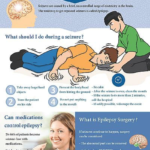How long does a seizure last? What is “Status Epilepticus”?
Almost all seizures end in about 1 minute.
Rarely, seizures may go on for a much longer period of time. If a seizure goes on for more than 5 minutes, the patient is said to be in a condition called “Status Epilepticus”. Status Epilepticus is a medical emergency – the patient needs to be given rescue medications to stop the seizure immediately. Such a patient needs to be rushed to the nearest hospital immediately.
When many seizures happen one after the other in rapid succession, then again the person is said to be in Status Epilepticus. This again is a medical emergency.
Although any epilepsy patient may get Status Epilepticus, it is uncommon and unlikely to happen if you have not had prolonged seizures before. As mentioned in the first line of this answer, almost all (>90%) of seizures end in about 1 minute or less.
What are the 2 most common reasons for harm during a seizure?
Most seizures do not result in permanent bodily harm.
There are two main reasons for bodily harm during a seizure. These are worth highlighting:
2. Aspiration / Choking
The entire concept of first-aid during a seizure is to prevent these two things.
What can I do to prevent aspiration?
When a foreign body goes into the wind-pipe or lungs, it is called aspiration. If the foreign body is large enough (e.g. a stick or coin) it may block the wind-pipe leading to choking. If it is a liquid – such as the person’s own vomit – then it may go into the lungs and produce an infection of the lungs (pneumonia).
In summary: Aspiration is to be prevented at all costs.
Thus, for preventing aspiration:
- Do NOT put anything into the mouth of the patient while he/she is having a seizure.
- Do NOT put your hand in the patient’s mouth – your fingers could be cut off.
- Turn him/her to one side, so that any vomit flows out from the mouth.
- After you are absolutely sure that the seizure has ended completely, you can remove any large food objects in the mouth.
- Do NOT give the patient any food or water until the seizure ends completely and he/she is completely conscious.
What can I do to prevent injuries during a seizure?
If the patient has frequent seizures, then some preparation to avoid injuries is justified.
- Try to avoid furniture with glass or very hard metal corners which can result in injury.
- Consider carpeted floors or wood floors instead of stone floors.
- In children who have multiple daily seizures with drop-attacks, consider using a plastic helmet at all times to prevent head injury.
As soon as you see a seizure happening:
- Try to prevent the patient from falling and hitting the ground hard.
- If possible, ease him/her to the ground.
- Remove all surrounding hard furniture.
Should I video-tape the seizure on my smartphone?
The eyes can only see what the mind already knows, and additionally, human memory is fallible.
Especially if there are two people around it makes perfect sense to record the seizure in it’s entirety, from beginning to end.
While recording, make sure that the entire body is visible. Do not change the camera angle excessively and do not end the video recording before the seizure ends. In fact, even after the seizure ends talk to the patient – ask him/her his/her name, what happened, and ask him/her to name a few things around the house and finally to hold up both arms.
A good video recording can provide completely invaluable information to your treating physician. If you bring 2-3 (or even more!) such video recordings to your doctor, the nature of your seizures becomes crytal clear. This helps tremendouly in choosing medications and if required, considering surgery.
This is a lot of information! How do I remember this in an emergency?
Don’t worry: Click on the image below to download it. Print it and put it up in your home.
| Caution: This information is not a substitute for professional care. Do not change your medications/treatment without your doctor's permission. |
 Dr. Siddharth KharkarDr. Siddharth Kharkar has been recognized as one of the best neurologists in Mumbai by Outlook India magazine and India today Magazine. He is a board certified (American Board of Psychiatry & Neurology certified) Neurologist. Dr. Siddharth Kharkar is a Epilepsy specialist in Mumbai & Parkinson's specialist in Mumbai, Maharashtra, India. He has trained in the best institutions in India, US and UK including KEM hospital in Mumbai, Johns Hopkins University in Baltimore, University of California at San Francisco (UCSF), USA & Kings College in London. |


